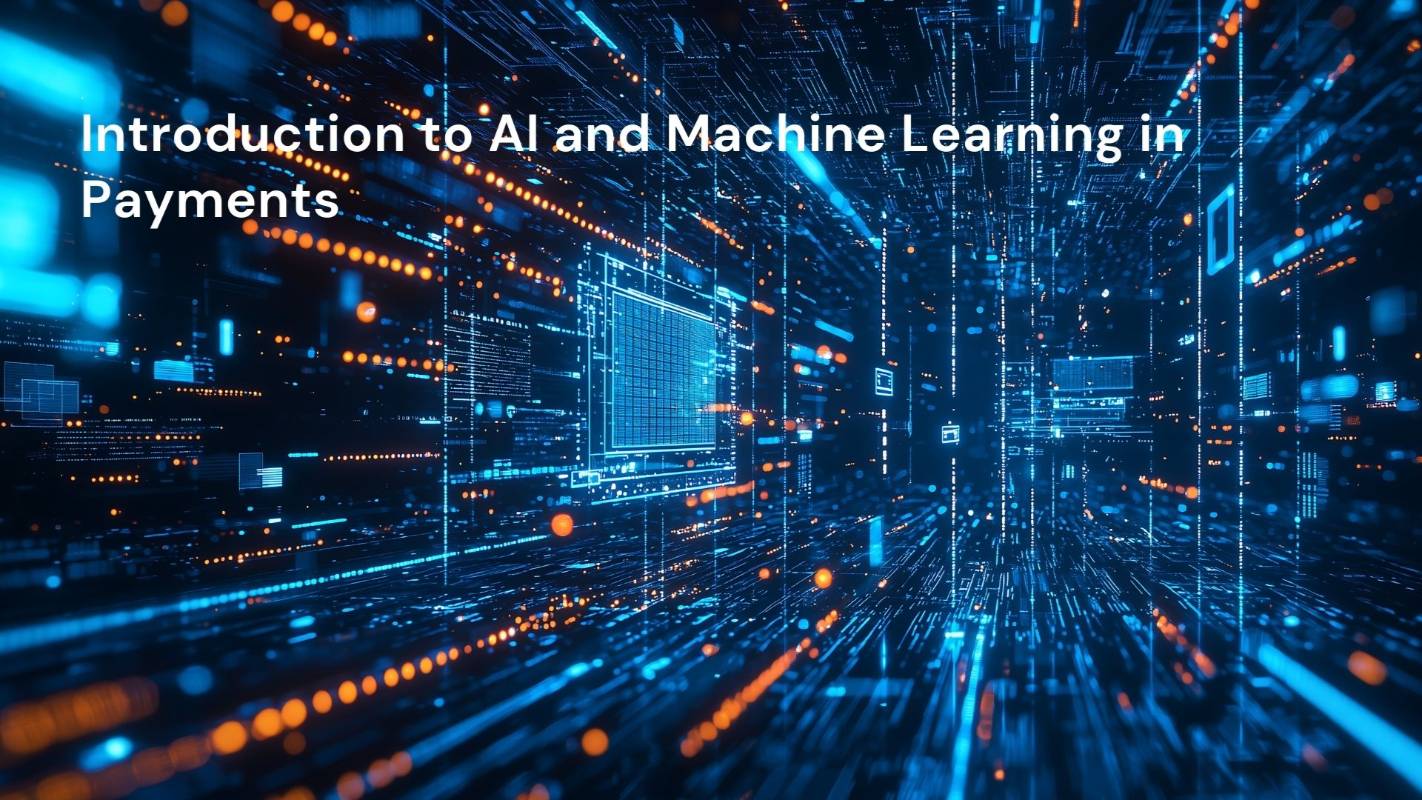Artificial intelligence (AI) and machine learning (ML) are reshaping the payment industry by introducing advanced capabilities that enhance security, streamline processes, and elevate user satisfaction in digital transactions.
AI refers to the use of computer systems capable of performing tasks typically requiring human intelligence, such as interpreting language, detecting patterns, or making decisions. ML, a subset of AI, enables these systems to learn from data and improve their performance over time without being explicitly programmed. For example, an e-commerce site might use ML to anticipate user preferences and deliver customised product recommendations, creating a more engaging shopping experience.
Importance in the payments industry
AI and ML technologies are becoming increasingly important across the payments ecosystem due to their ability to solve complex challenges and optimise performance. One of the most valuable applications is in fraud detection. By analysing transaction data in real time, ML models can detect unusual behaviours and flag potential fraud instantly, helping to protect both merchants and consumers from financial loss.
In addition to security, AI also enhances convenience. Payment platforms can use AI to suggest preferred payment methods based on previous usage, accelerating checkout times and improving the user journey.
As these technologies continue to evolve, they’re also enabling more personalised payment experiences. By learning user habits, AI can deliver tailored solutions that improve satisfaction and strengthen customer loyalty.
Applications in payment processing
AI and machine learning have become essential tools for improving the efficiency and precision of payment processing. By applying sophisticated algorithms, these technologies help automate, secure, and streamline the entire transaction lifecycle.
Smarter fraud detection and prevention
One of the most impactful uses of AI in payments is fraud prevention. Unlike traditional rule-based methods, AI systems analyse vast volumes of transaction data to detect suspicious behaviour and outliers. These models can identify red flags like unusual spending patterns, geographic inconsistencies, or device anomalies that deviate from a user’s typical activity.
Because machine learning models evolve, they can adapt to new fraud techniques, providing an ever-improving defence system. For example, AI can monitor behavioural biometrics and detect point-of-sale irregularities in real time. This proactive approach not only helps prevent financial losses but also builds trust by making transactions more secure.
By using these intelligent systems, platforms can take immediate action when fraudulent activity is suspected, reducing exposure and maintaining a safe payment environment.
Enhanced customer experience
In the competitive landscape of digital payments, user experience plays a vital role, and AI is at the heart of improving it. These technologies help reduce false transaction declines, making the checkout process smoother for genuine customers.
AI also contributes to faster and more accurate transaction approvals, whether online or in-store. By learning user habits, payment systems can anticipate preferences and accelerate routine actions. Additionally, automated support powered by AI offers instant responses to customer queries, reducing wait times and improving satisfaction.
Another crucial enhancement is in identity verification. AI-driven tools ensure secure yet frictionless verification processes, minimising disruption during transactions. These advancements make it easier for businesses to offer reliable, intuitive payment solutions that boost customer confidence and loyalty.
Benefits of AI and machine learning in payments
AI and ML technologies offer transformative benefits across the payments landscape, redefining how businesses process transactions by improving speed, accuracy, and overall system security. Their implementation supports smoother operations, greater trust, and a future-ready payments environment.
Increased efficiency and speed
In today’s fast-paced digital economy, speed is essential, and AI delivers it by automating tedious and repetitive tasks. Activities such as data consolidation, transaction reconciliation, and payment matching are handled rapidly, reducing manual involvement and improving throughput.
Machine learning enhances this further by identifying trends, predicting optimal workflows, and flagging inconsistencies in real time. These insights lead to faster approvals, quicker payment cycles, and reduced operating costs, all while improving your end-user experience.
Real-time monitoring and compliance checks can be embedded into the process, ensuring that each transaction is both secure and efficient from start to finish.
Enhanced security measures
Security is a cornerstone of any payment infrastructure. AI excels in spotting anomalies that would otherwise go undetected by traditional systems, such as subtle behavioural shifts or irregular transaction patterns.
This level of vigilance dramatically strengthens defences against fraud and cyber threats. Furthermore, AI supports regulatory compliance by processing massive volumes of data to meet requirements like KYC (Know Your Customer) and AML (Anti-Money Laundering) protocols.
Challenges and considerations
While AI and machine learning unlock transformative potential in the payments sector, their integration also introduces notable challenges. Businesses must address these concerns thoughtfully to fully harness the benefits while maintaining compliance and trust.
Data privacy concerns
Data privacy is a critical concern when deploying AI and ML technologies in financial environments. Processing extensive volumes of sensitive customer information, ranging from transactional behaviour to personal identifiers, demands rigorous compliance with global data protection standards.
Organisations must implement advanced safeguards, including data encryption and anonymisation protocols, to prevent unauthorised access or misuse. At the same time, transparency plays a vital role: users expect to understand how their data is collected, used, and stored. Failing to meet privacy expectations or regulatory mandates such as GDPR could result in substantial penalties and reputational harm.
Striking the right balance between real-time AI processing and individual privacy rights is key. Clear communication about data handling practices fosters greater user trust and reinforces your compliance posture.
Implementation complexities
Bringing AI and machine learning into existing payment ecosystems can be technically complex. Legacy systems often lack the flexibility needed to accommodate modern AI solutions, requiring scalable strategies that align with your current architecture.
Integrating intelligent models into these older systems demands significant coordination, especially when internal technical expertise is limited. Challenges may include training models on reliable datasets, ensuring system compatibility, and managing performance across distributed environments.
Moreover, the explainability of AI decisions is increasingly important. Businesses and regulators alike must be able to interpret and audit automated decisions, particularly those affecting users’ finances. This necessitates the development of explainable AI frameworks and ongoing model evaluation processes to ensure reliability and fairness.
Ultimately, overcoming these challenges requires a strategic approach that blends technological readiness, regulatory understanding, and a commitment to ethical innovation in the payments space.
Future trends in payments
As the payments landscape evolves at a rapid pace, AI and ML are emerging as central forces shaping the future of transaction systems. These technologies are not only redefining how payments are processed but also creating smarter, more secure, and user-centric financial experiences.
Predictive analytics
Predictive analytics, powered by AI, is set to become a cornerstone of modern payment infrastructure. By analysing historical transaction data, AI-driven systems can anticipate user behaviour and forecast potential risks. This forward-looking approach allows for proactive fraud prevention, spotting irregularities before they escalate into security breaches.
Payment platforms can identify when a transaction deviates from a user’s typical pattern, flagging it for review and reducing false declines. In doing so, predictive analytics ensures both higher approval rates and better fraud detection.
Beyond security, predictive models also empower businesses with real-time insights to optimise decision-making. Payment providers can adjust routing strategies and tailor services based on customer preferences, resulting in improved satisfaction and stronger brand loyalty.
Personalisation through AI
The future of payments also lies in delivering hyper-personalised experiences. AI enables payment systems to process large volumes of user data and customise interfaces, offers, and services accordingly. For example, if a customer frequently shops in a specific category, the system might recommend alternative payment plans or curated promotions to increase engagement.
This level of personalisation not only improves user experience but also reduces operational inefficiencies. As AI technologies continue to mature, payment providers will unlock more dynamic, responsive, and user-driven services, helping them stay competitive in an increasingly digital economy.
Conclusion
The integration of artificial intelligence and machine learning into payment systems has shifted from a competitive advantage to a business necessity. These technologies are redefining the landscape, streamlining transaction processes, fortifying security, and personalising the user experience in unprecedented ways.
As your business navigates this transformation, maintaining compliance with evolving data protection regulations and prioritising user privacy will be fundamental. By embracing AI’s predictive power and adaptive capabilities, you not only enhance operational efficiency but also build long-term trust with your customers.
Looking ahead, payment systems powered by AI will deliver faster, smarter, and more personalised experiences. Businesses that adopt these tools early are best positioned to lead in the digital economy, prepared to meet rising customer expectations and respond to the complexities of a connected financial future.
Start accepting crypto payments with Bitpace’s crypto payment gateway
Get paid in Bitcoin, Ethereum, Litecoin, and many more established cryptocurrencies with the Bitpace crypto payment gateway. Reach out now to start accepting crypto payments.





